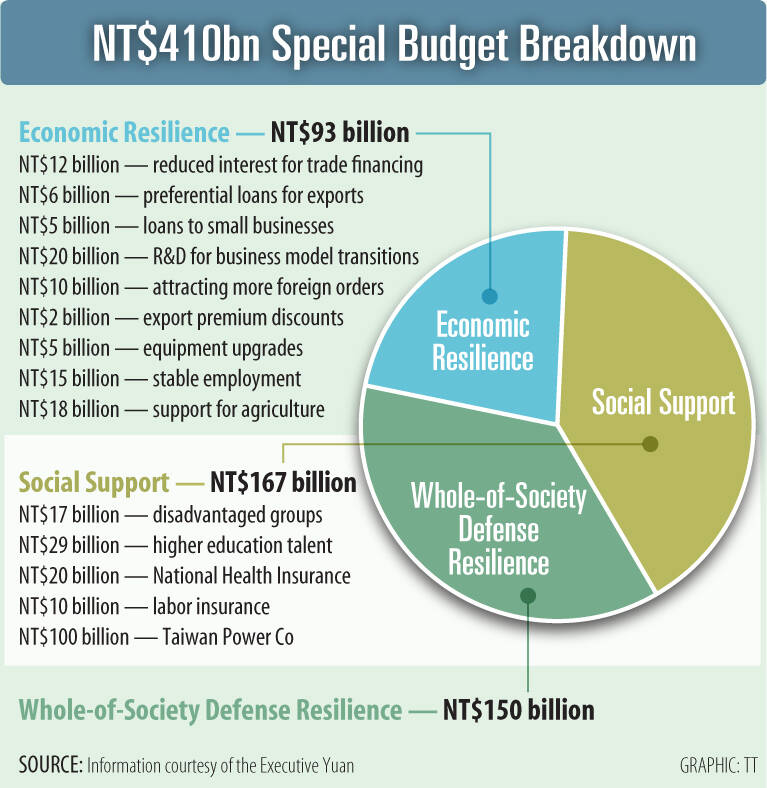The Cabinet yesterday approved a NT$410 billion (US$12.6 billion) special budget to enhance national security and boost economic resilience against the effects of US tariffs.
Based on the Cabinet’s proposal, it would earmark an additional NT$5 billion on top of the NT$88 billion package it approved earlier this month to help local businesses tackle the effects of US tariffs on industrial and agricultural sectors, and to stimulate the economy.
About NT$100 billion of the special budget would be earmarked for Taiwan Power Co (Taipower, 台電), Premier Cho Jung-tai (卓榮泰) told a news conference yesterday.

It represents the latest efforts by the government to lend a hand to the state-owned utility company, after legislators failed to endorse a NT$100 billion capital injection plan for Taipower.
Taipower is under mounting pressure to raise electricity rates to address massive losses of NT$420 billion accumulated through the end of last year.
The new funding would help stabilize the nation’s consumer prices, and shield Taiwanese industries and the broader economy from the potential effects of global economic shocks, Cho said.

Photo: CNA
In addition, about NT$150 billion of the special budget would be earmarked to bolster Taiwan’s national security, such as strengthening coast guard operations, developing uncrewed aerial vehicle infrastructure, and upgrading information and communications systems and facilities, Cabinet spokeswoman Michelle Lee (李慧芝) said.
About NT$167 billion would go toward financing social safety net programs, the Cabinet added.
It said it plans to use the government’s fiscal surplus to fund the special budget, although the proposed bill would allow for borrowing if necessary.
As the government has accumulated NT$358.9 billion in fiscal surplus over eight years as of last year, it does not plan to raise new debt, Cho said.
The budget is subject to the legislature’s approval.
The special budget would allow the Cabinet to allocate NT$410 billion in addition to its annual general budgets over the 33 months to the end of 2027 from March 12, the Cabinet said.
Even after the legislature approves the bill, the Cabinet would have to propose special budget plans and obtain the legislature’s permission to use the NT$410 billion.
The special budget would help push GDP growth to 2.9 percent or higher this year, based on an IMF estimate, Executive Yuan Secretary-General Kung Ming-hsin (龔明鑫) said.
Taiwan’s economy is facing major risks amid global financial uncertainty and GDP could grow less than 2 percent year-on-year this year.
Multiple think tanks have slashed their growth forecast by 0.4 percentage points to 1.5 percentage points due to the US’ 32 percent “reciprocal” tariffs announced on imports from Taiwan, despite a 90-day pause.

Conflict with Taiwan could leave China with “massive economic disruption, catastrophic military losses, significant social unrest, and devastating sanctions,” a US think tank said in a report released on Monday. The German Marshall Fund released a report titled If China Attacks Taiwan: The Consequences for China of “Minor Conflict” and “Major War” Scenarios. The report details the “massive” economic, military, social and international costs to China in the event of a minor conflict or major war with Taiwan, estimating that the Chinese People’s Liberation Army (PLA) could sustain losses of more than half of its active-duty ground forces, including 100,000 troops. Understanding Chinese

The Ministry of Foreign Affairs (MOFA) yesterday said it is closely monitoring developments in Venezuela, and would continue to cooperate with democratic allies and work together for regional and global security, stability, and prosperity. The remarks came after the US on Saturday launched a series of airstrikes in Venezuela and kidnapped Venezuelan President Nicolas Maduro, who was later flown to New York along with his wife. The pair face US charges related to drug trafficking and alleged cooperation with gangs designated as terrorist organizations. Maduro has denied the allegations. The ministry said that it is closely monitoring the political and economic situation

UNRELENTING: China attempted cyberattacks on Taiwan’s critical infrastructure 2.63 million times per day last year, up from 1.23 million in 2023, the NSB said China’s cyberarmy has long engaged in cyberattacks against Taiwan’s critical infrastructure, employing diverse and evolving tactics, the National Security Bureau (NSB) said yesterday, adding that cyberattacks on critical energy infrastructure last year increased 10-fold compared with the previous year. The NSB yesterday released a report titled Analysis on China’s Cyber Threats to Taiwan’s Critical Infrastructure in 2025, outlining the number of cyberattacks, major tactics and hacker groups. Taiwan’s national intelligence community identified a large number of cybersecurity incidents last year, the bureau said in a statement. China’s cyberarmy last year launched an average of 2.63 million intrusion attempts per day targeting Taiwan’s critical

‘SLICING METHOD’: In the event of a blockade, the China Coast Guard would intercept Taiwanese ships while its navy would seek to deter foreign intervention China’s military drills around Taiwan this week signaled potential strategies to cut the nation off from energy supplies and foreign military assistance, a US think tank report said. The Chinese People’s Liberation Army (PLA) conducted what it called “Justice Mission 2025” exercises from Monday to Tuesday in five maritime zones and airspace around Taiwan, calling them a warning to “Taiwanese independence” forces. In a report released on Wednesday, the Institute for the Study of War said the exercises effectively simulated blocking shipping routes to major port cities, including Kaohsiung, Keelung and Hualien. Taiwan would be highly vulnerable under such a blockade, because it